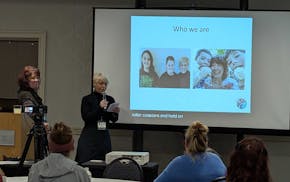If you're like many people, you love to have written more than you love to write. You take pride in crafting a well-written piece, but getting there takes too long.
How can you make the writing process more efficient?
Simple. Get up from your desk, take a few deep breaths, walk over to the nearest wall and pound your head against it. Generally, 10 times will do the trick, but if you're working in a padded cubicle you might have to make it 20.
Now return to your desk and ask yourself a few questions. Self-knowledge is a powerful tool.
First, how do you define efficiency? Do you measure it in time invested or energy expended?
Next ask yourself, at what stage in the writing process are you most and least efficient? Here's a typical five-stage writing process:
1. Defining your purpose
2. Conducting research (or gathering information)
3. Organizing your material
4. Writing your first draft
5. Revising your copy
Obviously, these five stages could be subdivided into additional steps. Defining your purpose might involve formulating a thesis statement and analyzing your audience. Organizing might involve making a detailed outline. Likewise, revising even the briefest message should always include proofreading.
However you delineate your writing process, avoid a common error: trying to save time by doing all the stages in a single step. Attempting to do so is a false economy. Often this one-time-through approach takes more time than thinking through an assignment and then proceeding step by step.
I recently worked with an accomplished writer – accomplished, as in he produced copy free of distracting errors in a style characterized by precise word choice and varied sentence structures. He wanted me to help him improve his efficiency in completing assignments. As he looked over my five-stage writing process, he assessed himself as most efficient at researching and least efficient at revising.
As we talked more, we realized that "efficiency" has many dimensions. He considered himself an efficient researcher, but he spent too much time researching because he enjoyed it and had trouble stopping. Similarly, he enjoyed revising more than drafting, but he considered himself inefficient at revising because he really enjoyed "making it shine."
Now we were having a good discussion, and there's nothing I enjoy more than a good discussion with an accomplished writer who wants to be even better … well, I guess there are a few things I enjoy more. I also enjoy talking about semicolons and restrictive commas.
Anyway, I now had an obvious answer for how he could improve his efficiency: Impose "stopping rules," as recommended by Gordon Davis and Clyde Parker in "Writing the Doctoral Dissertation: A Systematic Approach." The idea is to limit the time devoted to each stage in the writing process and establish interim deadlines along the way.
"I'm also going to compile a checklist," he said, "and let it guide my writing."
"Great idea," I said. "I can help you get started. Just Google 'Wilbers writing checklist.' "
He rubbed his head and smiled.
Stephen Wilbers offers training seminars in effective business writing. E-mail him at wilbe004@umn.edu. His website is www.wilbers.com.

U.S. Bancorp executive stopped responding to control tower minutes before Brooklyn Park crash

Minneapolis condo in historic Midtown Exchange building listed for $205,000

RFK Jr.'s controversial comments draw ire at Minnesota autism convention

Big medical expenses drove $176 million operating loss last year at Medica

